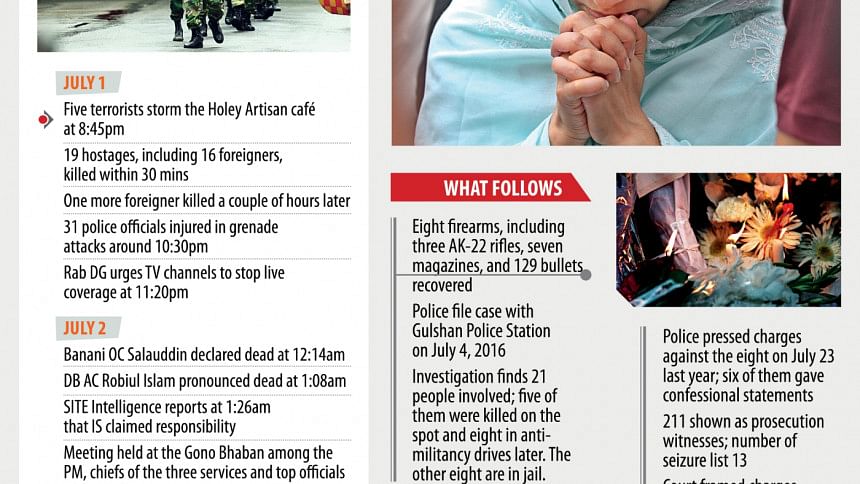Verdict today

The verdict in the Holey Artisan attack case is set to be delivered today.
Judge Md Majibur Rahman of the Anti-Terrorism Special Tribunal of Dhaka is scheduled to read out the judgement in presence of all eight accused in the afternoon, said court sources.
Security has been beefed up in and around the court and several other areas in the capital on the eve of the verdict.
On November 17, the tribunal had set today for delivering the verdict on completion of placing arguments from the prosecution and defence.
During the closing arguments, the prosecution sought capital punishment for the accused, saying that it was able to prove all the charges at the court.
The defence sought its clients’ acquittal, claiming that the charges were brought based on confessional statements of six accused who could not be trusted.
The closing argument started on November 6 and ended on November 17.
Earlier, the tribunal recorded statements of 113 out of 211 prosecution witnesses in the case.
During the trial proceedings, which ended in less than a year, several witnesses, including former North South University teacher Abul Hasnat Reza Karim, his wife, owner of the Holey Artisan restaurant, and top police officials narrated the horror that unfolded during the attack.
Hasnat was first shown arrested in the case, but was later relieved of the charges following a probe that found no evidence of his involvement.
On July 1, 2016, armed militants stormed the Holey Artisan Bakery at the diplomatic zone in Dhaka’s Gulshan area. The grisly terror attack left 22 people, including 17 foreigners, dead. Two police officers were also killed during the 12-hour standoff that followed.
On July 4 that year, Sub-Inspector Ripon Kumar Das filed a case with Gulshan Police Station under the Anti-Terrorism Act accusing six named and some unknown people of creating “unrest” in Bangladesh and trying to turn it into a “terrorist state”.
Police investigation later found involvement of 21 militants in the attack. Five of them were killed in the standoff, eight in anti-militancy drives later.
On July 23 last year, Inspector Humayun Kabir of the Counter Terrorism and Transnational Crime unit of police pressed charges against eight of the 21 militants. The chargesheet said the militants wanted to destabilise Bangladesh through its worst-ever terror incident.
The eight accused, now in jail, are Jahangir Alam alias Rajib Gandhi, alleged recruiter of the café attackers; Aslam Hossain alias Rash, one of the alleged planners; Abdus Sabur Khan alias Sohel Mahfuz, reported grenade supplier; suspected arms suppliers Mizanur Rahman alias Boro Mizan and Hadisur Rahman Sagor; Rakibul Hasan Regan, so-called religious trainer; and Shariful Islam Khaled and Mamunur Rashid Ripon.
The five gunmen, who held the diners hostage and were killed inside the upscale bakery in a commando operation launched to end the siege, are Nibrash Islam, Mir Sabeh Mubashir and Rohan Ibne Imtiaz, Khairul Islam Payel and Shafiqul Islam Uzzal.
The other eight killed later in different pre-emptive anti-militancy drives are Tamim Ahmed Chowdhury and Sarwar Jahan, top operatives of mainstream JMB and financiers; Nurul Islam Marzan, a Chittagong University student and café attack coordinator; Jahidul Islam, a retired major and trainer, Basharuzzaman Chocolate, a software engineer; Abu Raihan Tarik, a top operative, Tanvir Kaderi, a banker and financier; and Mizanur Rahman alias Chhoto Mizan, grenade supplier.
According to the charge sheet, the suspects carried out the attack to destabilise the country. They also wanted to put the government under pressure, make investors and foreign consultants leave the country and destroy the economy.
The suspects thought if they could kill a large number of foreigners, they would be under local and international spotlight. At the same time, they would be able to draw the attention of global terrorist groups, said the charge sheet.
On November 26 last year, the tribunal framed charges against the eight accused and the trial began on December 3.

 For all latest news, follow The Daily Star's Google News channel.
For all latest news, follow The Daily Star's Google News channel. 



Comments